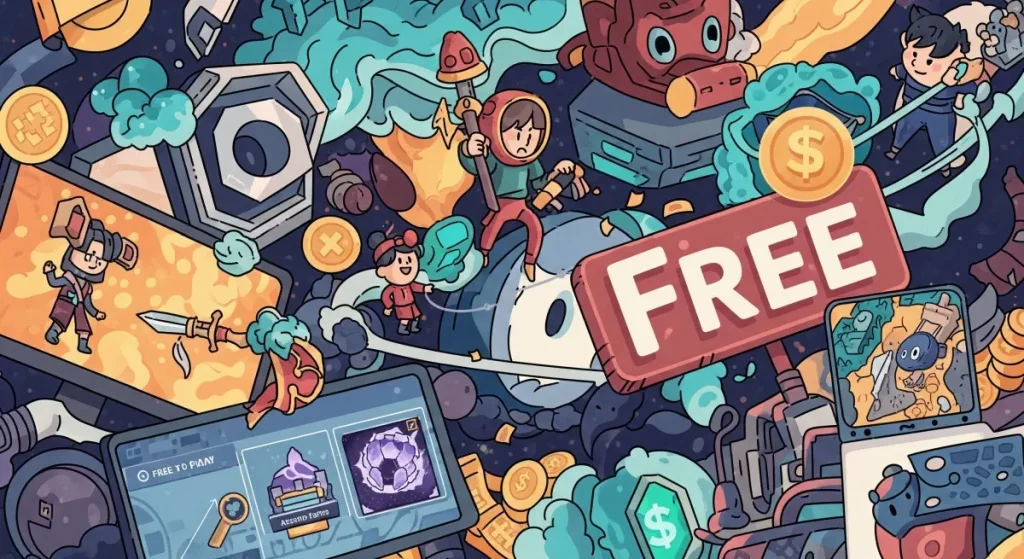The modern world of online gaming offers endless entertainment possibilities, and one of the most popular distribution models is free-to-play (F2P) games. These titles, available for free download, entice millions of players with the promise of uninhibited fun without initial costs. But does “free” always truly mean free? And is it worth dedicating your time to them? Let’s take a closer look at this phenomenon.
What are Free-to-Play Games and How Do They Work?
F2P games are titles you can play without paying for the game itself. Instead, their creators earn revenue through microtransactions – the sale of small, optional in-game items. These can include:
- Cosmetic items: Character skins, emotes, outfits that change appearance but don’t provide a gameplay advantage (e.g., Fortnite, League of Legends).
- Progress boosters: Items or services that reduce the time needed to acquire something, like experience points or in-game currency (e.g., many mobile games, some MMORPGs).
- Additional content: New characters, maps, game modes that might also be available for purchase with in-game currency, but at a slower rate (e.g., Apex Legends, Warframe).
- Seasonal Passes (Battle Pass): Offer access to exclusive rewards as you progress through a specific game season.
The F2P model creates a zero barrier to entry, attracting massive numbers of players and building dynamic, extensive communities.
Advantages of Playing F2P: When is “Free” Great?
- No barrier to entry: The biggest advantage. You can simply download the game and start playing immediately. This is ideal for testing out a title before deciding on potential expenses.
- Large communities: F2P often boasts gigantic player bases, meaning you’ll always find someone to play with, and queues for matches are short. This fosters an active social life within the game.
- Continuous development: F2P developers are strongly motivated to regularly add new content and patches to maintain player interest and encourage spending. These games often evolve over many years.
- Discovering new genres: Thanks to the F2P model, you can experiment with various game genres without worrying about spending money on something you might not enjoy.
Disadvantages and Pitfalls of F2P: When Does “Free” Come with a Cost?
- “Pay-to-Win” (P2W): This is the biggest criticism of some F2P games. If microtransactions give a significant advantage over players who don’t pay (e.g., through access to stronger items or characters), we refer to this as a P2W model. This can be frustrating and discouraging.
- Aggressive monetization: Some developers use very aggressive methods to encourage spending – pop-up offers, irritating ads, or intentionally slowing down progress to force the purchase of “boosters.”
- Grind and tedious repetitive tasks: To encourage spending money to skip certain stages, many F2P games intentionally extend the time needed to achieve certain goals, requiring repetitive and boring “grinding.”
- Long-term costs: Although the game is initially free, the cumulative expenditure on microtransactions in a favorite title can quickly exceed the price of a standard premium game, or even several such games.
- Addictive mechanics: Some F2P games utilize psychological mechanisms (e.g., loot boxes with random content) which can be seen as a form of gambling and lead to uncontrolled spending.
Is It Worth Playing F2P Games?
Absolutely, but with caution! Free-to-play games can provide hours of fantastic entertainment, provided you approach them mindfully.
How to get the most out of F2P without breaking the bank:
- Look for “Fair-to-Play” games: Many F2P games rely solely on cosmetics or optional conveniences, not giving an advantage to “paying” players. These are the titles worth your attention.
- Set a budget: Decide how much (if anything) you are willing to spend on microtransactions in a given month and stick to it.
- Enjoy the core gameplay: Remember that most F2P games are fully playable without spending a single penny. Focus on the gameplay itself, not on owning every available item.
- Read reviews and opinions: Before investing time (or money) in an F2P game, check what other players are saying about it, especially concerning its monetization model.
Free-to-play games are a powerful force in the world of digital entertainment. They offer easy access to engaging worlds and dynamic communities. The key to truly enjoying them is a conscious approach, understanding their mechanics, and avoiding the pitfalls that can lead to frustration or unnecessary expenses. Choose wisely, have fun, and remember – the most important thing is to have a good time!

